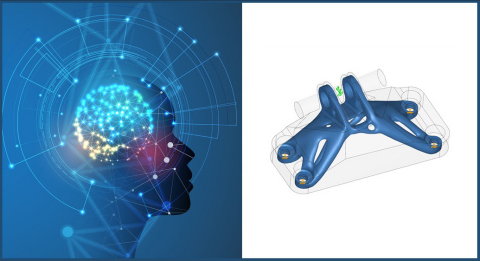Cutting-Edge Technologies to Guide Engineers and Designers to the Next Generation of Products
NEEDHAM, Mass. — (BUSINESS WIRE) — November 20, 2018 — PTC (NASDAQ: PTC) today announced that it has acquired Frustum Inc., an advanced generative design software company, for approximately $70 million. Frustum’s technology for generative design—an approach that leverages artificial intelligence (AI) to generate design options—is a transformative addition to the PTC Creo portfolio.
This press release features multimedia. View the full release here: https://www.businesswire.com/news/home/20181120005326/en/

PTC Adds Artificial Intelligence and Generative Design Capabilities to Enhance and Expand its CAD Portfolio with Acquisition of Frustum (Graphic: Business Wire)
Based in Boulder, Colorado, Frustum offers patented desktop and cloud-based engineering software that enables designers and engineers to go beyond the limits of their personal experience by leveraging powerful AI capabilities that guide the discovery of high-performance, next-generation product designs.
“PTC is pushing the boundaries of innovation with this acquisition,” said Jim Heppelmann, president and CEO, PTC. “Creo is core to PTC’s overall strategy, and the embedded capabilities from ANSYS and, later, Frustum will elevate Creo to a leading position in the world of design and simulation. With breakthrough new technologies such as AR/VR, high-performance computing, IoT, AI, and additive manufacturing entering the picture, the CAD industry is going through a renaissance period, and PTC is committed to leading the way.”
Frustum complements PTC’s strategic relationship with ANSYS, which was announced at LiveWorx in June 2018, and will bring analysis upstream to the very start of the design process. With embedded Frustum and ANSYS capabilities, Creo will be able to recommend design approaches using generative design, guide the user through the iterative design process using ANSYS Discovery Live, and ultimately validate the full product design at scale using the broader ANSYS Discovery suite. With these capabilities embedded in Creo, engineers will have unmatched capabilities to rapidly drive product innovation.
“This acquisition is a natural step for PTC and its customers,” said Jeff Hojlo, program director, product innovation, IDC. “AI and machine learning (ML) are widely discussed as two of the most impactful technologies of the future. For design, engineering, and R&D, the potential positive impacts of complementing the development process with AI and ML are astounding: lowering cost of quality (which is currently 20-25 percent of annual revenue at the average manufacturer), improving product success rate (which remains very low with more than 80 percent of products failing), and improving time to market and time to revenue by meeting customer needs accurately the first time.”
The Power of Generative Design
With generative design, engineers can interactively specify the functional requirements and goals of their design, including preferred materials and manufacturing processes—and even indicate key design parameters that take into consideration purchasing decisions, manufacturing capacity, supply chain status, and regional-required product variances. The system then uses AI and powerful high-performance computing techniques to present design alternatives for consideration as a starting point or as a final solution. By removing the constraints of human imagination and experience, engineers will be able to interact with the technology to create superior designs and innovative products more quickly.
Generative design is appealing to PTC’s vast customer base as they seek ways to:
- Increase engineering productivity
- Improve innovation and conceptual design exploration
- Develop higher-performance designs that are lighter weight, with improved durability
- Optimize new products for improved manufacturability, reduce material costs, and decrease manufacturing cycle times
- Create complex geometries optimized for additive manufacturing
- Deliver better products faster
The Impact of Artificial Intelligence
Integral to Frustum’s technology is a powerful AI component that learns, evolves, and, ultimately, performs key tasks, including:
- Providing valuable feedback to a designer early in the design phase
- Optimizing designs for multiple objectives simultaneously and offering a designer with multiple novel design alternatives, which enables companies to substantially reduce engineering cycles
- Modifying designs to manage multiple requirements and constraints, physics, materials availability, manufacturing processes, and design objectives
- Automating testing the outcomes of the design with other enterprise insights, including costing, supply chain, and quality data








